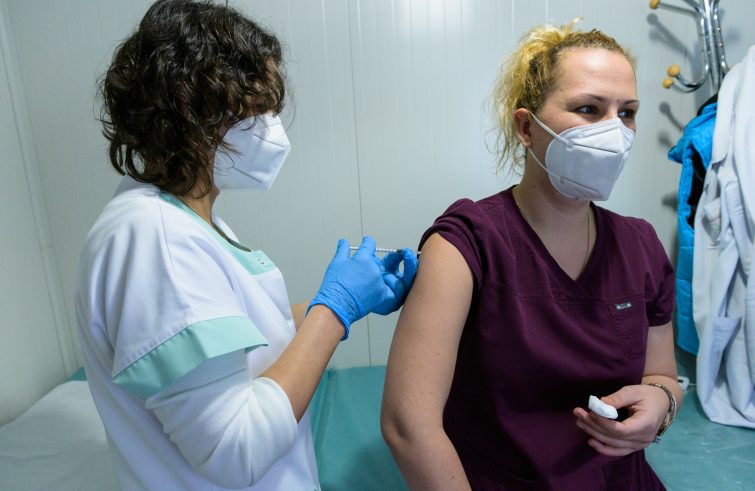
A constantly evolving scenario. Variant B 1.525 was isolated in Naples on 16 February, while a few days ago the National Institute of Health and the Ministry of Health reported a sustained circulation of the British variant nationwide, sparking off fears due to its increased transmissibility. According to Roberto Cauda, Professor of Infectious Diseases at Rome’s Catholic University and Director of the Infectious Diseases Unit at the Gemelli Polyclinic in Rome, the priority is
to increase the sequencing of viral samples, step up the vaccination campaign, and if necessary impose “targeted closings.”
 Professor, are you more worried about the spread of variants or about the delays in the vaccination campaign?
Professor, are you more worried about the spread of variants or about the delays in the vaccination campaign?
Mutations’ spread and slow-paced vaccination efforts go hand in hand. Mutations occur because the virus replicates, involving the possibility of mistakes in viral genome transcription, so-called mutations. The vast majority of them are inconsequential, but a proportion could affect the characteristics of the virus in terms of transmission and clinical aspects. This is why accelerating the pace of vaccinations is important.
The more people are vaccinated, the more the risk of virus replication – and therefore of virus variants- is reduced.
A ”flash survey” carried out by the National Institute of Health and the Ministry of Health on 12 February showed that the estimated prevalence of the British variant is 17.8%. Are we sequencing enough?
More should be done. Mutations can be found only if they are looked for; that’s the problem. Thousands of COVID-19 samples are sequenced in the UK every week. As a result, last September they discovered this variant, which has several mutations, most of which are spike protein mutations, which play an important role in SARS-CoV-2 entry into cells. Italy, however, has been keeping pace. The sampling you mentioned shows a sustained circulation of this variant, albeit with regional differences: ranging from zero to 59% of the strains isolated.
Is the British variant likely to become prevalent in the coming weeks?
That’s what happened in the UK. Due to the fact that it is more transmissible and infects children more easily, it could lead to a new surge in infections.
 Are the currently available vaccines effective against variants? How are they being tested?
Are the currently available vaccines effective against variants? How are they being tested?
Several studies are under way. Blood is drawn from vaccinated individuals to assess the rise in antibodies, compared to virus models or isolated strains in which the mutation has occurred. The British variant was first isolated last September; the South African variant in November; the Brazilian variant in December. We therefore have greater experience with the British variant against which the vaccines available have shown to be effective, albeit with some differences: Moderna and Pfizer are more effective, AstraZeneca slightly less so, but still sufficient to prevent it. The COVID-19 vaccine developed by Janssen, a subsidiary of pharmaceutical company Johnson & Johnson (for which a conditional Marketing Authorisation Application (cMAA) has been submitted to the EMA), showed 86% efficacy against the British variant and 60% against the South African variant, according to data published last week in the British Medical Journal. Less data are available for the Brazilian variant. Personally, I agree with the WHO:
Vaccines must be administered even in the presence of variants, as they retain a high degree of efficacy.
Vaccines can prevent the infection, or not prevent it, but they ensure that the disease is moderate or mild, thus preventing the severe forms. Our flu vaccines, which are 60%-70% effective, provide great protection.
Will they still need to be adjusted as variants evolve or new ones appear?
Just as rapid diagnostic tests – and maybe even bio-molecular tests – will likely have to be adapted, so will the vaccines designed to tackle the new variants. This should not be difficult. I have no direct information, but I understand from media reports at European level that, on the basis of past experience, a fast-track procedure is planned with no need to go through 1-2-3 development stages.
Is there any risk of Sars-Cov-2 becoming endemic?
This is the big question that cannot be answered at the moment. We do know that antibodies persist for months in acute infection. Antibody response is the easiest to detect. A blood sample is drawn and the amount of specific antibodies, the so-called antibody titer, is measured. A high titer indicates a high level of protection; a low titer suggests very little or no protection. However, in addition to neutralising antibodies, our body’s defences are also linked to cells, the so-called memory cells, which recognize virally infected cells in the event of a second exposure to the virus. The question is whether, in case of suboptimal antibody responses, this cellular immunisation acts as a ‘memory cell’ should people who have had the virus or have been vaccinated be exposed to the virus again. With regard to endemicity, the other question concerns child vaccination. Today, those aged 18 years and over are being vaccinated, but studies are under way for children aged 12 and over.
In my opinion, in the absence of contraindications, paediatric age groups should also be vaccinated.
Could monoclonal antibodies complement vaccines in the meantime?
The Italian Medicines Agency (AIFA) has set very strict criteria on the use of monoclonal antibodies: only in high-risk patients, either due to age or co-morbidity, and in the early stages of infection. They must therefore be administered at an early stage in a monoclonal antibody cocktail – one is not enough – to prevent the onset of serious conditions. They are not a useful preventive strategy because they do not prevent infection: they should only be administered to people who have already contracted the virus. Moreover, besides high costs, there are also supply chain issues. It is a potent weapon, to be used in carefully selected cases – to date it is the only such weapon, as the only registered drug, remdesivir, has failed to deliver the expected results in some cases. However, I personally would argue in favour of using vaccines produced in Russia and China, once health regulatory authorities approve them.
After Umbria, two thirds of which is ‘red zone’, four municipalities in Lombardy have now also been declared ‘red zone’. There have been proposals to introduce a nationwide lockdown. What is your opinion?
The current situation requires more stringent measures, focusing in particular on areas where variants are circulating. Clearly, apart from any other economic, social or psychological considerations, a national lockdown works. In my opinion, however, it should be based on the Israeli model, i.e. by simultaneously ensuring mass vaccination in order to prevent a resurgence of infections once lockdown measures are lifted.
Before reaching the stage of a full lockdown, which would entail the closure of schools and businesses that would be heavily affected economically, it might be advisable to consider ‘targeted closings’, such as those you have just mentioned, while stepping up existing measures by monitoring three parameters: COVID-19 Rt reproduction number, hospitalisation and intensive care units.








